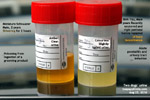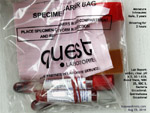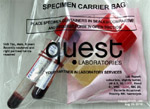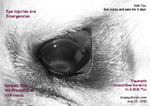I write this case of contrasting urine colours for vet undergraduates who may be struggling to remember so much information for their 4th year examinations. I hope this topic will bring veterinary medicine alive to students who unfortunately don't have the opportunity to see many interesting cases (being students)!
23.8.2010 case
Dog 1 - Miniature Schnauzer, 2 years, male, not neutered. Dog was groomed one week ago but the house-call groomer prohibited the owner to see. However, he recommended one shampoo for the dog. A shampoo different from what he uses. The owner bought the shampoo from the pet shop and used it 2 days ago.
Dog 2 - Shih Tzu, 8 years, male, recently neutered and repair of right perineal hernia. 4 days ago, had fever and urinary tract infection was diagnosed. Dog was given medication of antibiotics.
Complaint
Dog 1 - Shivering for 2 hours yesterday. Vomited twice after consultation.
Dog 2 - Cannot control bladder. Bites when backside is touched. Tongue pale. Vomited once after consultation.
Presenting signs
Dog 1 - shivering
Dog 2 - urinary incontinence
 Urine
Test Report From Laboratory:
Urine
Test Report From Laboratory:Dog 1 - Colour amber, clear, pH 6.5, SG 1.020, Blood Trace, WBC 25, RBC 5, Bacteria Occasional, Spermatozoa Occasional
Dog 2 - Colourless, slightly turbid. Colourless, slightly turbid. pH 6.5 (5-8), SG 1.005 (1.005 - 1.030). Protein - trace. Blood 4+, White blood cells >2250, Red blood cells 20, epithelial cells 0, Mucus Threads Occasional, Bacterial Occasional. Possible haemolysis of RBC in urine.
The low SG (Specific Gravity) of the urine is not a good clinical finding. The urine dipstick showed a low SG as well, but a pH = 8.0. See picture in Part 2 article.
The urine must be checked again. I got the urine test 24 hours later at the Laboratory. The SG was back to normal at 1.020 and the dog's tongue was not so pale. He could control his bladder. So what went wrong with his bladder congtrol system? It was likely the inflamed and infected prostate gland which was painful on palpation even on Day 2.
Blood Test Report From Laboratory:
For Dog 1, there is a high blood urea. This could account for the dog vomiting twice after going home. I did not give any treatment on the first visit of shivering complaint at 11 am. I just took urine and blood samples. The dog went home and vomited and came back at 5 pm.
For Dog 2, significant results are low haemoglobin and increase in total white cell count suggesting a bacterial infection in the urinary tract and prostate. Antibiotic treatment had been given for the last 3 days (Details below).
What's the problem and what's the cure?
 Get
the history of management and
past illness, general
examination of the whole body
externally including genital
area, abdominal palpation is
very important, urine test,
blood test at the first stage
of consultation.
Get
the history of management and
past illness, general
examination of the whole body
externally including genital
area, abdominal palpation is
very important, urine test,
blood test at the first stage
of consultation. History taking can take a long time and patience. In Dog 1, I asked whether there was an anti-tick shampoo used by the house-call groomer as this dog had suffered shivering and tremors of the body some months ago after the use of an anti-tick wash by the groomer at the pet shop.
The answer was correctly no. I did not expect the owners to purchase a new brand of dog "shampoo" as I presumed incorrectly that the owners would stick to the old brand. Later, when the daughter brought the bottle for me to see, it was not a shampoo but a "silky coating brush spray" to detangle, soften and repel dirt.
The shampoo was applied on the coat without rinsing as the instructions on the bottle were to "spray directly on the dog's coat after bathing or when brushing daily."
Here, many Singapore owners would be thinking of this product as a "shampoo". The bottle had this caution - "For External Use Only. Avoid contact with eyes." The Schnauzer most likely disliked the perfume fragrance and licked all ingredients to get rid of the smell, as in a cat grooming. The product had 17 ingredients, two of which were chamomile flower and rosemary left extracts. This dog specifically disliked chemicals on his body and would have ingested the grooming products meant to keep the coat tangle-free and silky.
General examination and abdominal palpation. The whole body must be examined. Sometimes it is best to ask the young lady to look elsewhere when the vet examines the penile tip. Yesterday one lady in her late 30s, not related to the above 2 cases, screamed in surprise when I checked the penile tip of her old poodle as part of my general examination. She had sent the old dog for treatment of the skin diseases after her one-year-stay in Hong Kong. Her parents in their late 60s would not want to spend money treating this old dog with recurring scales did not bother and so she brought the old dog in.
For Dog 1, the penile tip was very red. I told the young lady that the dog had been self-stimulating. She did not believe me as the dog was behaving normally when the family members were around. Urine test showed "occasional spermatozoa".
 For
Dog 2, I could feel a hard
globular lump of 3 cm x 3 cm.
The dog reacted in pain.
This was the inflamed
prostate. As for the urinary
incontinence, it would be due
to prostatitis (narrowing or
urethra and painful
urination).
For
Dog 2, I could feel a hard
globular lump of 3 cm x 3 cm.
The dog reacted in pain.
This was the inflamed
prostate. As for the urinary
incontinence, it would be due
to prostatitis (narrowing or
urethra and painful
urination). Tentative diagnosis:
Dog 1 - Poisoning from ingestion of grooming products.
Dog 2 - Prostatitis causing urinary incontinence
Treatment:
Dog 1 - IV drip to dilute the poison in the blood. The dog had a slightly elevated blood urea. He is young and I expect him to recover fully.
Dog 2 - Pallor of tongue indicated a more serious problem. The blood haemoglobin was low. The total white cell count in the blood and urine was high indicating a bacterial infection. The dog was given an anti-androgenic injection 1.4 ml Tardak yesterday, antibiotics, IV drip, Vit K1, antibiotics and was warded for treatment. Yesterday evening, his tongue colour returned to a normal pink. Much more investigation work needs to be done. All the young lady and mum want is a dog back to health. "Will this dog die?" It is hard to predict. Dogs do die when the vet thinks there will be a good clinical outcome. Some dogs with chronic diseases don't die although their deaths would be welcome by the owners!
P.S
 TIPS
FOR MINIATURE SCHNAUZER
OWNERS: In the above case,
I advised neutering to
relieve him of his
hypersexuality (dog keeps
urine marking the apartment
and possibly doing
self-stimulation when home
alone) and prevention of
male-related problems in old
age (perineal hernias,
circum-anal tumours,
prostratitis, prostate and
testicular tumours).
TIPS
FOR MINIATURE SCHNAUZER
OWNERS: In the above case,
I advised neutering to
relieve him of his
hypersexuality (dog keeps
urine marking the apartment
and possibly doing
self-stimulation when home
alone) and prevention of
male-related problems in old
age (perineal hernias,
circum-anal tumours,
prostratitis, prostate and
testicular tumours).
His ear canal is full of ear
hairs and he cried in pain
when my groomer tried to pluck
the excessive hairs out of his
ear canal to provide proper
ear ventilation. Lateral
ear canal resection
surgery is advised as part of
a veterinarian's
responsibility to help the dog
as he gets very frightened
after grooming.
Some owners will think that
the vet is trying to drum up
more business for him. So I am
not surprised that many vets
don't bother to advise more
than the existing problem
being handled!
See Part 2 of the story at:
 TOA
PAYOH VETS
TOA
PAYOH VETS

